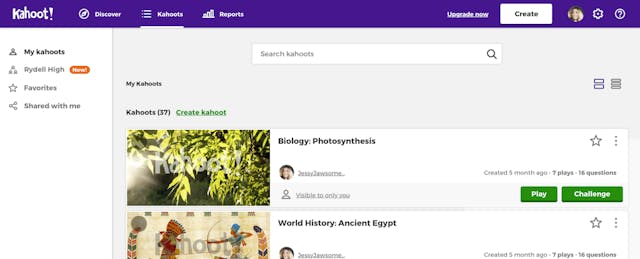After launching five years ago—and seeping into nearly half of all U.S. schools—Kahoot is offering the first premium version of its game-based learning platform.
Until today, Kahoot’s website and mobile app, which feature nearly 60 million multiple-choice quizzes, have been completely free for students and teachers. Nothing about that will change or go away, Asmund Furuseth, the company’s CEO, emphasized in an interview. But schools that sign on to Kahoot Pro will get special access to time-saving, collaborative features for teachers to use.
Annually, Kahoot Pro costs $12 per teacher for K-12, the company’s primary market in education, and $60 per instructor for higher education.
“It’s a very favorable price point, we believe, to enable schools to systematically use Kahoot in better ways,” Furuseth tells EdSurge.
According to Furuseth, the company opted for a “soft launch” for Friday’s release of Kahoot Pro because its executives worried anything more grandiose might send mixed messages to educators with whom the free version of the app is widely popular.
With the premium version, teachers will be able to co-create and edit quizzes, called kahoots, in a private folder on the Kahoot website, accessible only by premium users at the school. That folder may help teachers find their school’s unique quizzes more easily, as the free version requires users to sift through millions of search results. Premium users will also have access to a library of millions of images, which are displayed on the quizzes, and performance reports that track student progress. They’ll also be able to brand their private Kahoot account with a school logo.
Kahoot had publicly been building out a premium version since March, Furuseth said. In a recent survey, the company found that 75 percent of its education users work at a school where at least 10 other educators use Kahoot with their students, and 60 percent of those teachers are already working together to create games on the platform.
The play could be about more than just meeting a user demand. Kahoot, a Norwegian company, may have been feeling pressure from investors, who have injected $43.5 million into the company, according to Crunchbase. Its offerings have been free for teachers for more than five years. After raising tens of millions of dollars to create and fine-tune those offerings, investors were probably ready to see some returns on that money.
It’s a case reminiscent of other edtech companies that eventually moved away from “freemium” products. Remind, the K-12 messaging platform, introduced a paid option in August 2017, after offering its products for free since the company’s launch in 2011. And Padlet, the digital bulletin board, did the same thing in April.
At Kahoot, however, providing a free game-based learning platform to educators is built into the company’s mission, Furuseth said, and the company is able to continue providing that indefinitely because it can offset losses with the revenue it generates from the business sector.
In addition to its classroom presence, Kahoot also offers a premium product for businesses, which costs $240 per user per year. Almost half of Fortune 500 companies have a license, Furuseth said, primarily for HR and training purposes.
“The fact that we have paying customers for the business sector enables us to have much lower and much more favorable prices for teachers in the school version,” Furuseth said. “The businesses are paying in such a way that it’s a donation model” in education.
Today, Kahoot reports 70 million monthly active users globally and projects that number will reach 100 million by next year. It’s too soon to say how many of those users will get access to Kahoot Pro for schools, but since testing began a few months ago, the company already has picked up premium users across education institutions globally, Furuseth said.


